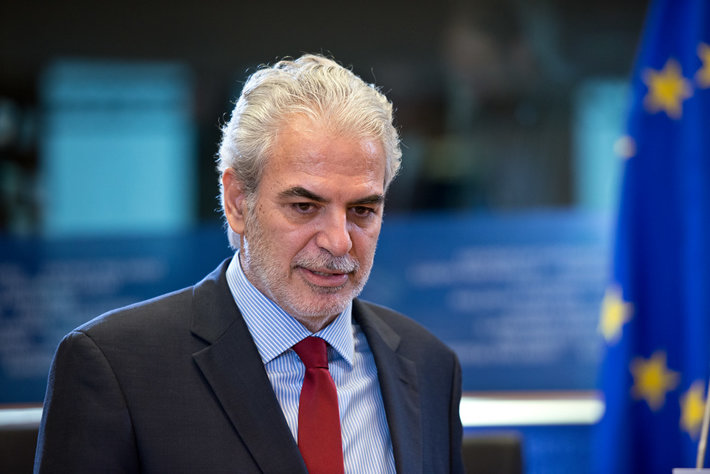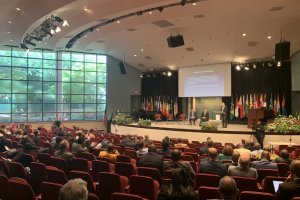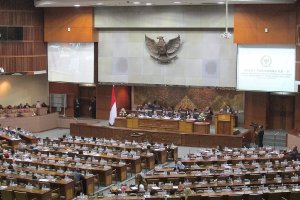The European Commission’s recent appointment of a crisis management expert as the new special envoy for freedom of religion demonstrates the importance that Europe attaches to the issue of international religious liberty at a time when crimes against humanity continue to require urgent attention.

That is the view of several analysts who have hailed the May 5 appointment of Christos Stylianides as a European Union Special Envoy for promotion of freedom of religion or belief (FoRB) outside the European Union.
The post was eliminated in November 2019 and vacant until the appointment of Stylianides—“a welcome sign” that the European Commission, the executive branch of the European Union, “continues to recognize the importance of engaging on the topic of freedom of religion or belief internationally,” according to the International Institute for Religious Freedom. A global network of academicians, the institute is dedicated to introducing the subject of religious freedom in higher-education programs and curricula worldwide, especially in the fields of religious studies and theology.
A faculty member in the Department of Primary Care and Population Health at the University of Nicosia Medical School, Stylianides served as European Commissioner for Humanitarian Aid and Crisis Management from 2014 to 2019. He played a major role as EU Ebola Coordinator from 2014 to 2016 in global efforts to combat the Ebola virus outbreak.
The Special Envoy’s mandate is relatively recent, established February 4, 2016, in a European Parliament resolution “on the systematic mass murder of religious minorities” by Islamic State terrorists in the Middle East.
Little wonder that Stylianides accepted his appointment “with full understanding of the importance of this role,” as he put it in a May 5 Twitter message.
As he takes office, one of the world’s largest peace-building organizations, Search For Common Ground, suggested three ways the European Union can “take action to acknowledge the key role FoRB plays in wider social issues.”
Writing in the EU Observer, a Brussels-based independent not-for-profit online newspaper, Sharon Rose, Global Director of Religious Engagement at Search For Common Ground, suggested that first and foremost, FoRB must be understood as a fundamental right separate from what she said was a trend to view it as somehow working against the rights of women or the LGBTQI community.
“Recognizing FoRB’s interconnection with other rights enables us to address overlapping concerns and intersectional claims,” Rose wrote. She said her organization is set to take precisely such an approach as part of a new secular and interfaith consortium, the Joint Initiative for Strategic Religious Action, whose mission is to build bridges across divided communities in Indonesia, Iraq, Kenya, Ethiopia, Uganda, Mali and Nigeria.
Second, the European Union must work for a wider acknowledgment of FoRB’s role in establishing and maintaining peaceful societies resilient to social disruptions. Rose noted the value of inviting the participation of religious and secular leaders on broad social issues in the EU’s Global Exchange on Religion in Society. A two-year project of networking, societal capacity building and social media engagement, the organization’s mission is to facilitate a global conversation about diversity, coexistence, civic engagement and social inclusion.
Additionally, Rose cited a set of conclusions reached in June by the Council of the European Union on the “EU Concept on Cultural Heritage in Conflicts and Crises.” The conclusions, the author noted, “highlight the need for interfaith dialogue and the inclusion of religious minorities as part of the EU’s external push for peace, democracy and sustainable development.”
“As with all approaches to FoRB and peace-building generally, women, youth and other vulnerable groups like religious minorities need to be included in these exchanges,” Rose emphasized, adding: “These groups often experience unique violations of their rights and, when included, bring new perspectives and unforeseen solutions to conflicts.”
Finally, EU institutions and staff must be adequately trained on issues pertaining to FoRB, especially the role it plays in transforming conflict. “Increasing their faith literacy as well as their understanding of religious engagement’s value would be in line with the 2013 guidelines on the promotion and protection of freedom of religion or belief,” Rose said.
“Neither peace-building nor advancing FoRB are linear processes—setbacks require patience, steadfastness and a long-term belief in the possible,” the Rose concluded. “But with its new special envoy at the helm, the EU can play a significant role in effectively moving us toward a world where our diversity of beliefs is valued and respected by all.”
______________
The Church of Scientology publishes this blog to help create a better understanding of the freedom of religion and belief and provide news on religious freedom and issues affecting this freedom around the world.
The Founder of the Scientology religion is L. Ron Hubbard and Mr. David Miscavige is the religion’s ecclesiastical leader.
For more information, visit the Scientology website or the Scientology TV network.


